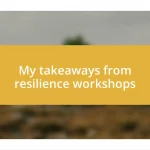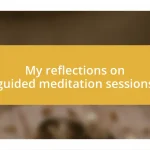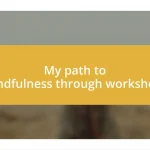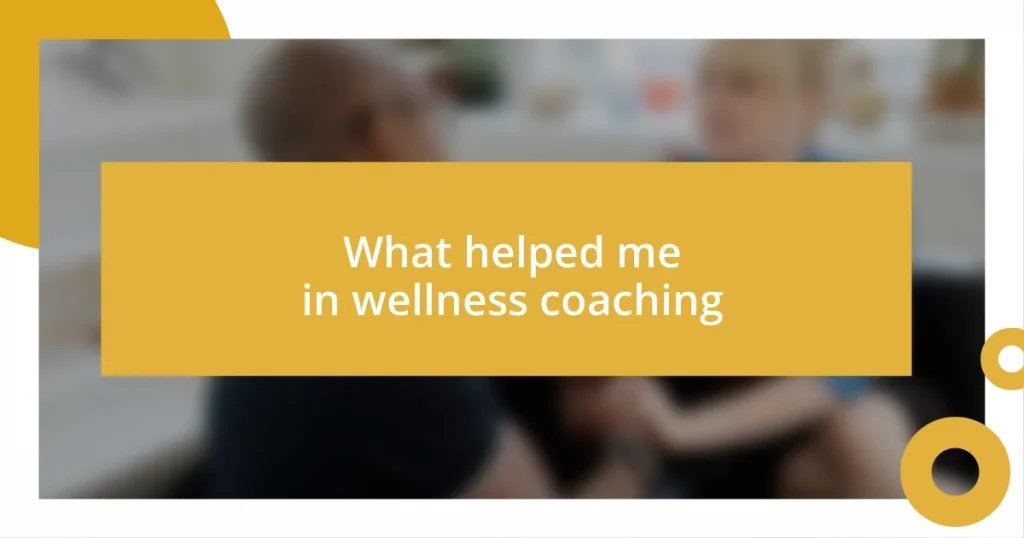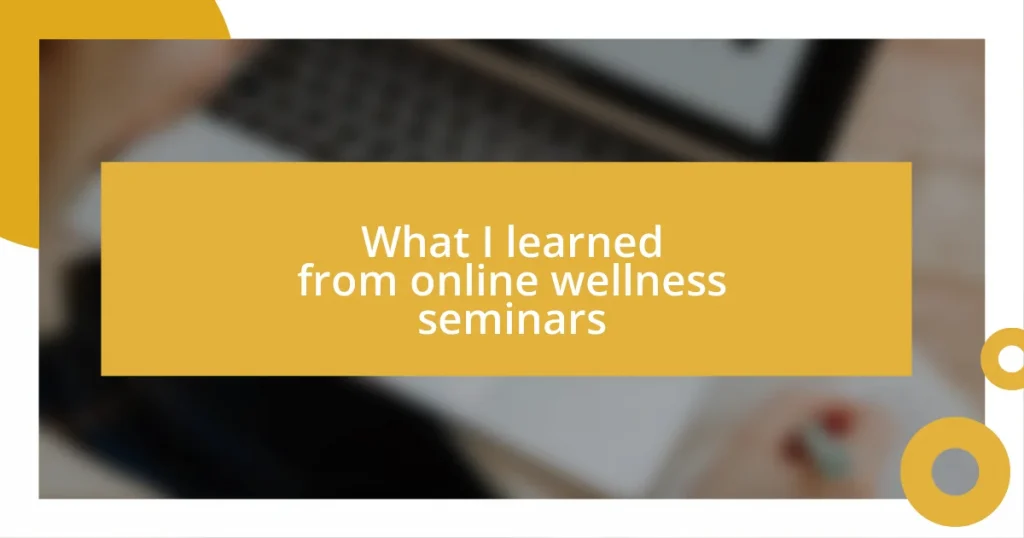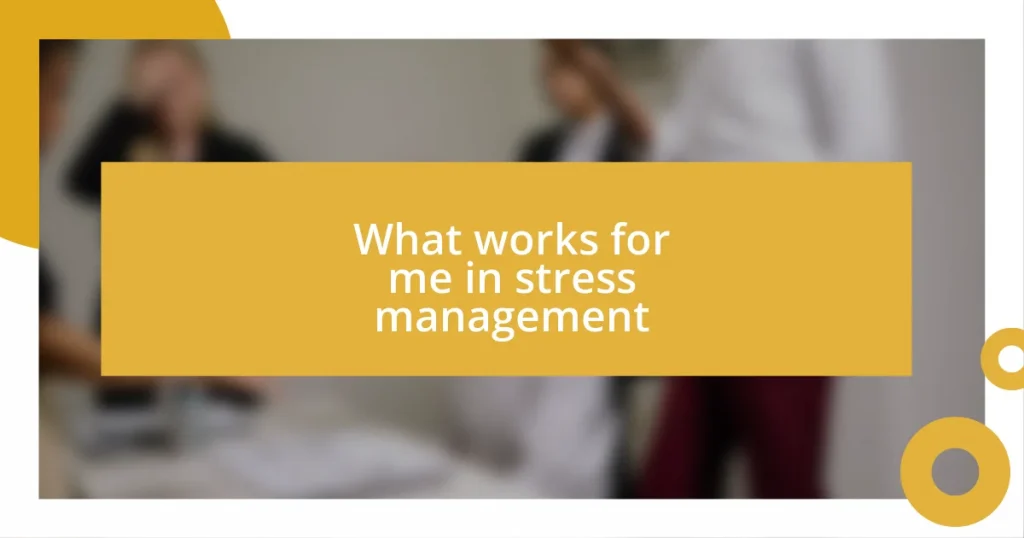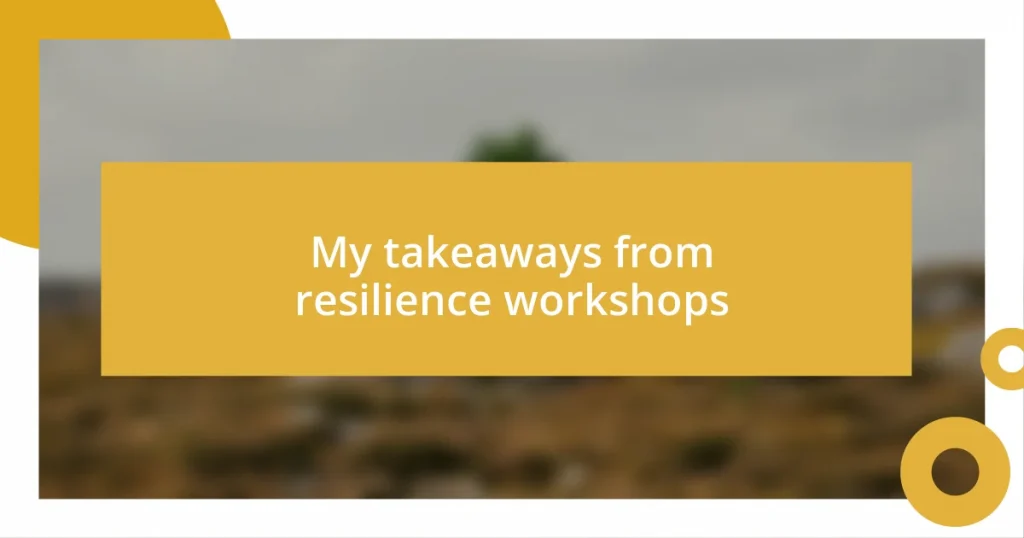Key takeaways:
- Personal transformation motivates wellness coaching, emphasizing the importance of small, sustainable changes.
- Essential skills for effective coaching include active listening, empathy, and goal-setting to foster strong client relationships.
- Continuous learning through workshops, books, and peer support enhances coaching effectiveness and personal growth.
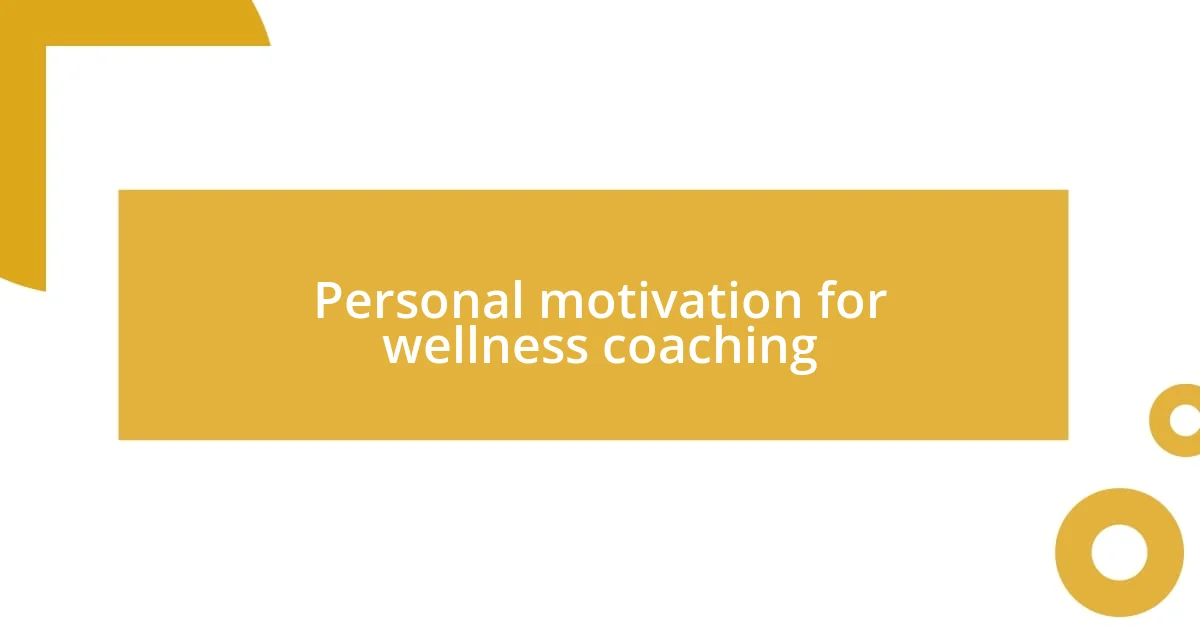
Personal motivation for wellness coaching
One of the main reasons I pursued wellness coaching was my own transformative journey. I remember feeling overwhelmed and exhausted after years of neglecting my health. That moment when I chose to prioritize my well-being was pivotal; it ignited a spark in me that I wanted to share with others. Have you ever felt that turning point when you realized change was necessary?
As I delved deeper into my wellness journey, I discovered the profound impact of small, sustainable changes. I started engaging in mindfulness practices, and it was nothing short of eye-opening. The clarity I gained from simply taking a few deep breaths each day made me wonder—how many people miss out on this powerful tool? I now feel driven to help others uncover these simple yet profound techniques that can elevate their lives.
Another layer of my motivation comes from witnessing the struggles of friends and family. I often found myself in conversations where they expressed frustration over their health goals. It was then that I realized I could be a bridge to change, a source of support for those who felt lost. Isn’t it rewarding to know that you have the ability to uplift and empower others? Being a wellness coach isn’t just about guiding; it’s about creating a community of support, understanding, and shared journeys.
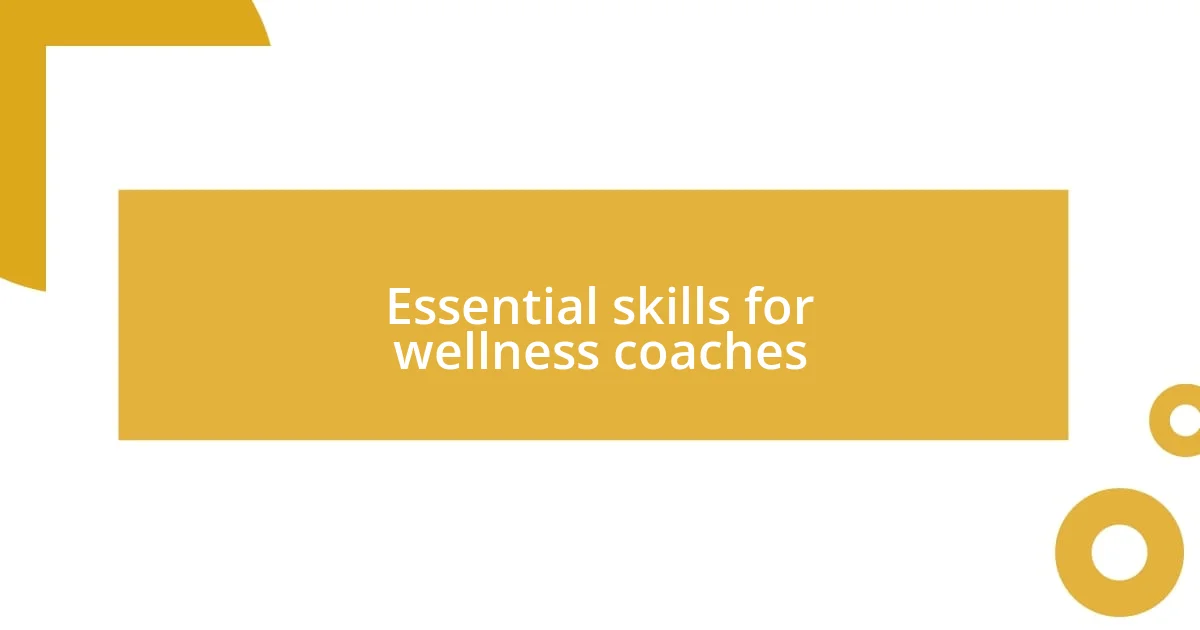
Essential skills for wellness coaches
To be an effective wellness coach, a diverse skill set is essential. It goes beyond simply knowing about health; it involves connecting with people on a personal level. I recall a client who came to me struggling with self-doubt. With compassion and active listening, I could create a safe space, empowering them to open up about their challenges and aspirations. That’s the magic of being present—seeing my clients for who they are and guiding them through their unique journeys.
Here are some essential skills every wellness coach should cultivate:
- Active Listening: Truly hearing what clients express, both verbally and non-verbally, helps build trust and understanding.
- Empathy: Being able to put myself in my clients’ shoes allows me to respond to their needs with insight and compassion.
- Communication: Clear, motivational language can inspire change and keep clients engaged.
- Problem-Solving: I often find creative solutions tailored to individual challenges, shifting perspectives that empower actionable steps.
- Goal-Setting: Helping clients define realistic and meaningful goals can make their wellness journeys feel attainable.
- Knowledge of Wellness Practices: An understanding of nutrition, exercise, and mental health strategies ensures I provide well-rounded support.
- Adaptability: Each client is uniquely different; being flexible in my coaching style allows me to meet diverse needs.
Embracing these skills has not only enhanced my practice as a wellness coach but also enriched my interactions, making them more fulfilling for both my clients and myself.
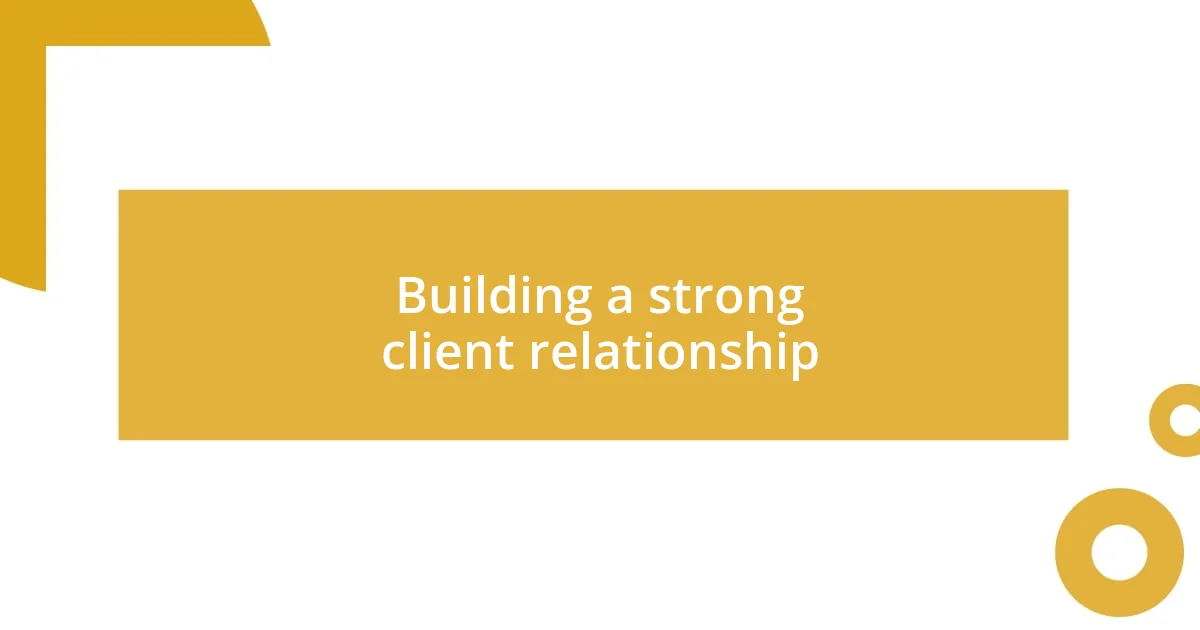
Building a strong client relationship
Building a strong client relationship is the heart of being an effective wellness coach. I remember working with a client who was initially hesitant to share personal details about their struggles. By taking the time to establish trust through open communication, I let them know that their vulnerabilities were safe with me. This relationship blossomed into a partnership where they felt empowered to share not just their goals, but the fears holding them back. What’s more rewarding than witnessing someone trust you with their journey?
Another key aspect of building these relationships is consistency. I make it a point to check in with my clients between sessions. A simple message or even a quick phone call can remind them that I’m invested in their progress. I recall a moment when a client wrote back saying my message “made their day.” It’s incredible how such small gestures can reinforce a sense of belonging and accountability. Isn’t it fascinating how deep connections can enhance motivation?
Finally, I believe that celebrating milestones—big or small—is crucial in nurturing a strong client relationship. Whether it’s acknowledging a client’s dedication to their daily yoga practice or their first successful meal prep, recognition fosters encouragement. I always say, when we shine a light on achievements, no matter how minor, we create a positive feedback loop that builds confidence. Have you ever noticed how celebrating wins can motivate you to strive even further?
| Aspect | Importance |
|---|---|
| Trust | Creating a safe space for clients fosters openness. |
| Consistency | Regular check-ins reinforce commitment and support. |
| Celebration | Acknowledging milestones boosts confidence and motivation. |
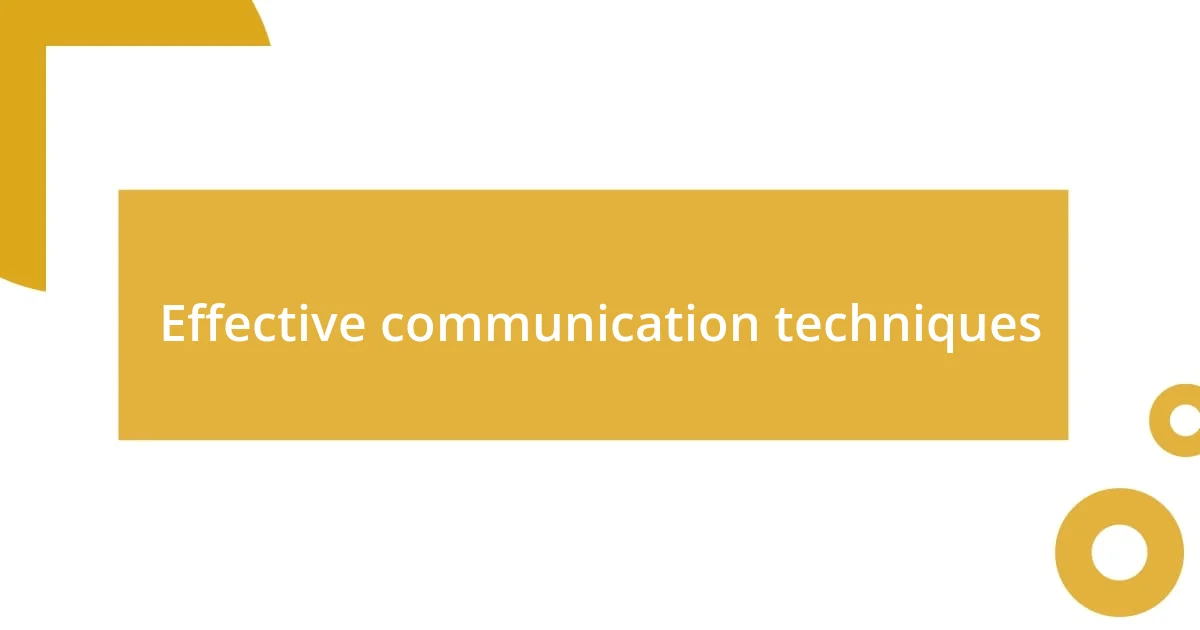
Effective communication techniques
Effective communication is at the core of my coaching approach. I’ve learned that it’s not just about what we say, but how we say it. For instance, during a session with one client, I noticed that simple, affirming statements had a profound effect. When I told her, “Your journey matters,” she visibly relaxed, realizing she was valued. Have you ever felt that instant connection when someone genuinely acknowledges your story?
Using open-ended questions can also encourage deeper conversations. One time, I asked a client, “What does wellness look like for you?” This question shifted the focus entirely. Rather than dictating solutions, it invited them to explore their own desires and aspirations. The beauty of this technique is that it helps clients take ownership of their wellness journey. Isn’t it remarkable how a single question can spark such insightful discussions?
Non-verbal communication is another pillar that I often emphasize. The way I position myself—leaning in when a client speaks or maintaining eye contact—sends a strong message of empathy and engagement. During one particularly emotional session, a client shared a deeply personal story. My calm demeanor and attentive posture seemed to offer them the reassurance they needed to continue. Have you ever noticed how much can be communicated without saying a word? Emotional intelligence in these moments is key to building a trusting environment.
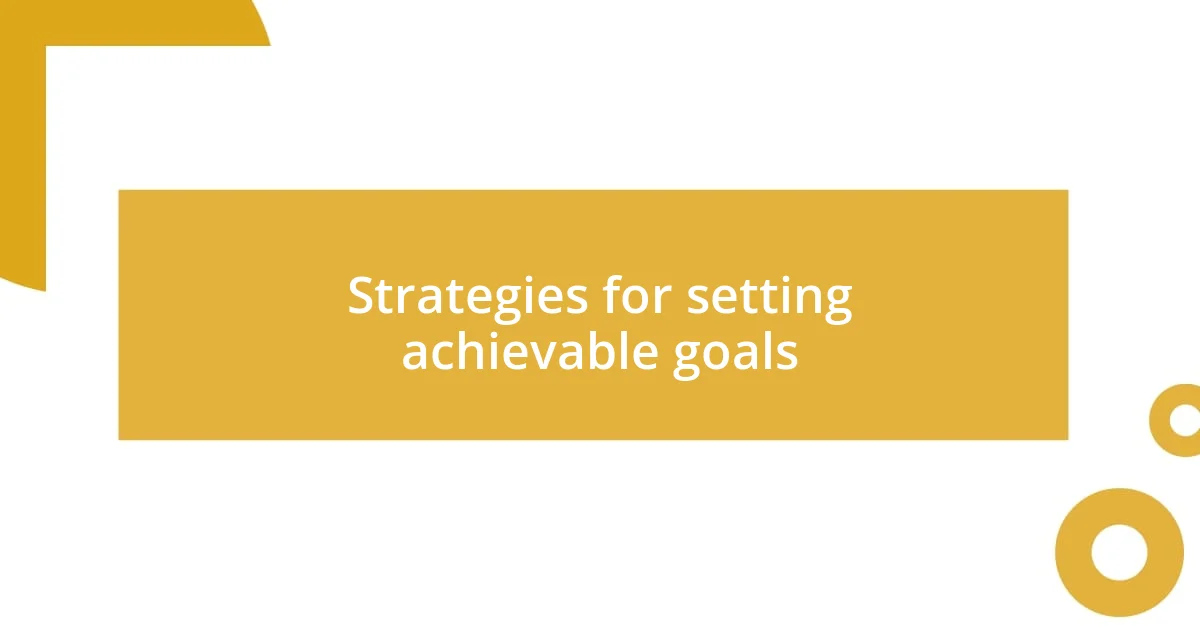
Strategies for setting achievable goals
Setting achievable goals is an art that combines clarity and realism. I recall a client who aimed to lose 30 pounds in three months. After some discussion, we broke it down into smaller, weekly targets, which made the journey feel less overwhelming and allowed her to celebrate each mini-win. Have you noticed how small victories can build momentum?
Another strategy I find effective is using the SMART criteria—Specific, Measurable, Achievable, Relevant, and Time-bound. For instance, I had a client who wanted to incorporate more physical activity into their routine. By transforming their vague goal into “I will walk for 30 minutes every weekday after work,” we created a clear plan that fit seamlessly into their life. Don’t you think having a roadmap can make a world of difference in achieving your goals?
Lastly, it’s crucial to regularly review and adjust goals based on progress and feedback. One time, a client expressed frustration over not hitting their expected milestone. Instead of viewing this as a setback, we reassessed the goal, adapting it to be more attainable. That shift not only renewed their motivation but also reinforced the understanding that wellness is a dynamic journey. Have you experienced the power of flexibility in your own goal-setting?
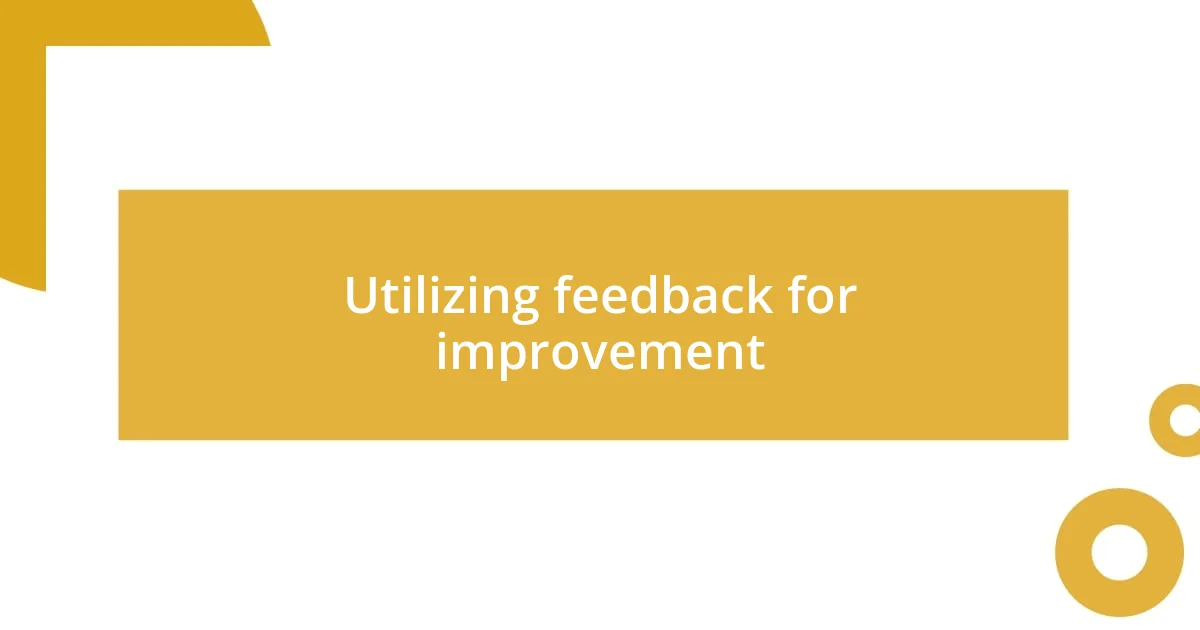
Utilizing feedback for improvement
Feedback is an invaluable tool in wellness coaching. I remember a particular moment when a client pointed out that my suggestions felt overwhelming at times. I took that to heart and realized that lighter, more manageable steps could lead to greater success. Have you ever had a conversation that reshaped your approach to a task?
Regular check-ins can be eye-opening as well. After implementing a new technique with one of my clients, I asked for their thoughts. They mentioned that while they appreciated the method, it wasn’t hitting the mark for them. This feedback not only helped me tailor my approach, but it also made them feel heard and empowered in their journey. Isn’t it amazing how a simple conversation can shift the course of progress?
Finally, celebrating small feedback can enhance motivation. When a client shared a little victory—like opting for a healthier snack—our discussion around it created a positive ripple effect. By highlighting their achievements, we reinforced their commitment. How often do we reflect on our small wins? Embracing these moments can truly elevate the wellness journey.
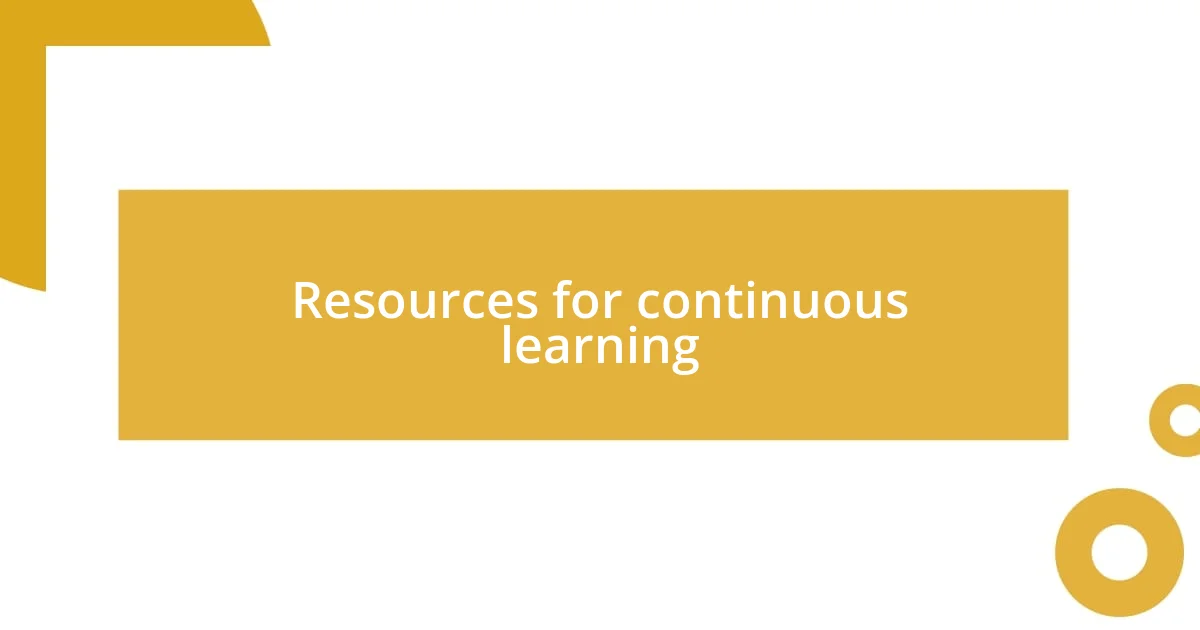
Resources for continuous learning
Learning never truly ends, especially in wellness coaching. I’ve found that attending workshops and webinars is a fantastic way to enhance my skills and stay updated on new trends. Recently, I participated in a virtual summit focusing on mental health strategies, and it sparked so many ideas that I’ve started integrating into my sessions. Have you ever experienced that excitement of learning something new that just clicks with you?
Books are another treasure trove of knowledge. I remember getting my hands on a well-reviewed book about motivational interviewing techniques. The author shared real-life case studies that resonated with my coaching experiences, deepening my understanding of client interactions. It’s like having a conversation with a mentor right there on the page. Isn’t there something powerful about flipping through pages that feel alive with wisdom?
Lastly, connecting with peers through online forums or local coaching groups can provide fresh perspectives and support. I once joined a Facebook group for wellness coaches, and the camaraderie was amazing! Sharing challenges and victories with fellow professionals not only helped me feel less isolated but also opened doors to new techniques I hadn’t considered before. Have you found that community is an essential part of your growth journey? It certainly has been for me.


